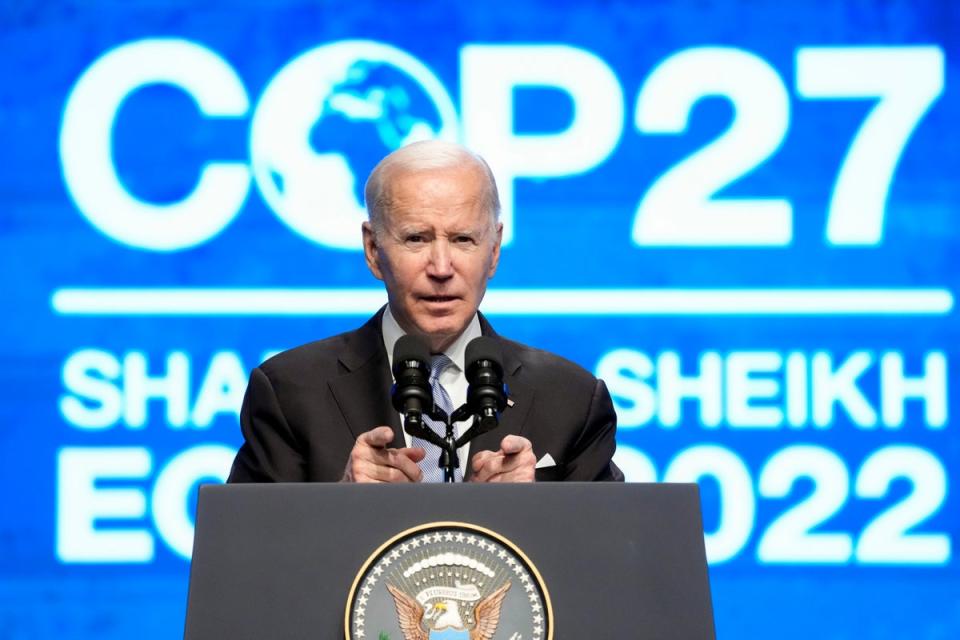Biden’s $369bn green plan was hailed as a triumph – but does it live up to the hype?

Decades from now, when America casts back over its long battle with the climate crisis, how will 2022 be remembered?
It was the year that the Inflation Reduction Act (IRA), in essence the most meaningful climate law in US history, was signed by President Joe Biden.
A key achievement of his second year in office, it may also be the last significant climate progress that he makes this term after the House of Representatives swung to GOP control in the November midterms. (Not a single Republican senator voted in favour of the IRA.)
Nevertheless, the legislation will funnel $369bn into decarbonising every corner of the US economy over the next 10 years. Funds will be allocated to diverse projects – from solar panel and wind turbine manufacturing and electric vehicle charging stations to bike lanes, tree-planting, coastline restoration and making American homes more energy efficient and resilient to extreme weather.
“This bill is the biggest step forward on climate ever and it’s going to allow us to boldly take additional steps toward meeting all of my climate goals,” President Biden said in August.
The administration and its allies say the IRA, combined with other federal and state efforts, means that the US will hit its target of halving emissions by 2030 (over 2005 levels).
However, new data has cast some doubt on this optimistic projection. The Energy Information Administration (EIA), the nonpartisan statistical agency within the Department of Energy, revealed there will be modest emissions cuts this year and in 2024, even after the IRA is taken into account.
“The bad news for all of us but also for the Biden administration, and whoever succeeds [it] – which could be Biden – is that in no single year, will they come close to hitting the rates needed to be in line with 2025 or 2030 targets,” said Roger Pielke Jr, a professor of environmental studies at the University of Colorado Boulder who specialises in policy and governance issues, and analysed the EIA data.
“Policy evaluation can be brutal because it’s simple math and reveals where we’re going versus where we wish we were going. In this case, we’re not on target,” Professor Pielke told The Independent.
However, he also said that in general, the Biden administration “has been one of the most successful presidencies in a generation in terms of significant legislative accomplishments, and that’s facing a very difficult partisan environment in Washington”.
Via email, a White House spokesperson told The Independent: “The Inflation Reduction Act is the largest investment in the clean energy transition in history and will reduce greenhouse gas emissions by about 1 gigaton in 2030 – 10 times more than any other single piece of legislation ever enacted.”
Backers of the IRA say that it will set off a chain reaction in the private sector, and “unleash trillions of dollars” for clean tech innovation, as Democratic Congressman Ro Khanna told The Intercept last year. And beyond the US, the IRA will have a ripple effect, says global strategy firm Wood Mackenzie, as other countries race to keep up.
“That will be a net gain for the world, not a zero-sum game: a levelling-up of policy support will unlock new business opportunities for the entire globe,” a recent report said.
This forecast gained credence at the World Economic Forum’s meeting in Davos this week after the European Union announced that it would channel funds towards green industries to prevent companies from moving to the US, Reuters reported.
But Professor Pielke sounded a note of caution on the idea of a global clean tech race, pointing to Germany’s current plans to destroy the small village of Luetzerath to make way for a coal mine expansion.
“Energy development is going on all around the world and people want cheap energy,” he said. “If they can get it, they want clean [energy], and if they can’t get clean, they’ll still take it dirty.”
Deep within the 700 pages of the IRA were some “very problematic provisions”, said Jean Su, senior attorney and energy justice program director at the Center for Biological Diversity.
She described the IRA as a “historic and positive step” but also said that “the Biden administration has done a solid job in marketing” the legislation.
“The Inflation Reduction Act made a couple of severe trades in terms of exacerbating our reliance on fossil fuels,” she told The Independent, pointing out one clause for offshore wind farm leasing which requires the Department of Interior to also offer leases for offshore oil and gas drilling.

Questions remain over how some aspects of the legislation will implemented. The IRA offers various tax credits and rebates to help Americans make their homes more energy efficient and to buy electric vehicles but Ms Su decribed this system as “a bit of a black box” with no clear explainers for people on how it works. A White House spokesperson directed The Independent to CleanEnergy.gov.
Ms Su also described the Biden’s administration’s 2022 record on fossil fuels as “abysmal”, saying that Mr Biden had cemented a long-term market for liquified natural gas (LNG) – a fossil fuel largely made up of the potent greenhouse gas methane.
The president announced last March that the US would ship more LNG to Europe in order to cut off the bloc’s reliance on Russian supplies following its invasion of Ukraine.
“This is totally the opposite direction of where we need to go for climate,” Ms Su said.
A White House spokesperson told The Independent that the administration was taking steps to help partners navigate acute energy shocks caused by Russia’s war in Ukraine, and said that the president “has underscored, ultimately, real energy security will require an accelerated global clean energy transition”.
“President Biden has done more than any president in US history to tackle the climate crisis, and has no intention of slowing down now,” the statement also read.
The Biden administration has attacked with gusto the environmental and climate policy rollbacks of former president Donald Trump. As of 6 January, Mr Biden had added 59 environmental policies and proposed another 55, according to aWashington Post tracker. (Eighty-five of Trump’s environmental polices had been overturned, 88 targeted, and 59 left alone.)
Among these, Mr Biden reversed Mr Trump’s rollback on environmental reviews for infrastructure projects. President Trump overhauled the National Environmental Policy Act, a landmark Nixon-era environmental law which low-income and minority communities have used for decades to fight back against polluters.
Mr Biden used his brief appearance at the Cop27 climate summit in November to announce tightened restrictions on the oil and gas industry’s methane leaks and operational flaring of the gas which has 80 times the heating impact of carbon dioxide in the short term.
While the IRA failed to make as big a splash at Cop27 as the White House had hoped, the Biden administration was appplauded for supporting developing countries’ demand for a global “loss and damage” fund to help with ever-worsening disasters – something which the US had long opposed.
”It’s a huge victory for Global South countries who’ve asked for this for the last 30 years,” Ms Su said.
Mr Biden’s climate envoy, John Kerry, also said that the US was supportive of a call from many vulnerable countries calling for the phase-down of fossil fuels (the statement failed to make the final Cop27 agreement after pushback from oil-rich countries Saudi Arabia, Iran and Russia).
Climate and environmental organisations say they intend to keep the pressure on the Biden administration to push for the phaseout of fossil fuels at the Cop28 summit later this year.
The Independent has contacted the State Department for comment.

 Yahoo News
Yahoo News 
